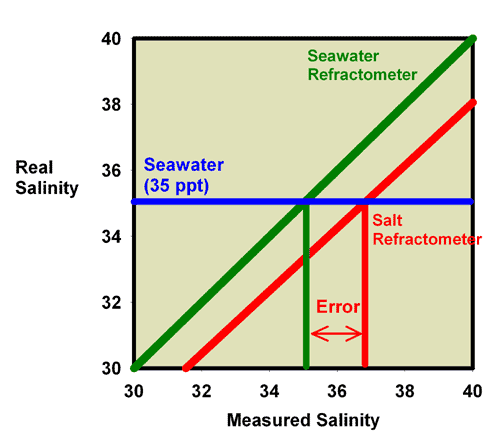Some text from this link---
http://reefkeeping.com/issues/2006-12/rhf/index.php
Imperfect Refractometer Use: Scale Misunderstanding and Salt Refractometers
Refractometers can lead to incorrect readings in additional ways and, again, these issues abound for reef aquarists. One is that many refractometers are intended to measure sodium chloride solutions, not seawater. These are often called salt or brine refractometers. Despite the scale reading in ppt (?) or specific gravity, they are not intended to be used for seawater. Unfortunately, many refractometers used by aquarists fall into this category. In fact, very few refractometers used by hobbyists are true seawater refractometers.
Fortunately for aquarists, the differences between a salt refractometer and a seawater refractometer are not too large. A 35 ppt sodium chloride solution (3.5 weight percent sodium chloride in water)
has the same refractive index as a 33.3 ppt seawater solution, so the error in using a perfectly calibrated salt refractometer is about 1.7 ppt, or 5% of the total salinity. This error is significant, in my opinion, but not usually enough to cause a reef aquarium to fail, assuming the aquarist has targeted an appropriate salinity in the first place. Figure 23 shows the relationship between a perfectly calibrated and accurate salt refractometer and a perfectly calibrated and accurate seawater refractometer when the units are reported in salinity. This figure shows the measured salinity reading for seawater being about 1.7 ppt higher than it really is.

Figure 23. The relationship between the real (actual) salinity and the measured salinity (in ppt) for a perfectly calibrated seawater refractometer (green) and a perfectly calibrated salt refractometer (red). This salt refractometer effectively has a significant slope error, with values far from the calibration point (freshwater with a salinity of 0 ppt) reading roughly 1.7 ppt higher than the actual value. Salt refractometers reading in salinity can be recalibrated using seawater to eliminate nearly all of this error (just as the refractometer in Figures 17 and 18 was recalibrated in seawater to give Figures 21 and 22).
It turns out that this is a slope miscalibration in the sense that a perfectly made sodium chloride refractometer necessarily has a different relationship between refractive index and salinity than does seawater. This type of problem with a refractometer
IS NOT at all corrected by calibrating it with pure freshwater. If you have this type of refractometer, and it was perfectly made and calibrated in freshwater, it will ALWAYS read seawater to be higher in salinity than it actually is (misreporting an actual 33.3 ppt to be 35 ppt).
Even more confusing, but perhaps a bit less of a problem in terms of the error's magnitude, salt refractometers sometimes read in specific gravity. But that value is specific gravity of a sodium chloride solution with the measured refractive index, not seawater with that refractive index. A sodium chloride solution with the
same refractive index as 35 ppt seawater (which turns out to be 36.5 ppt sodium chloride) has a specific gravity matching 34.3 ppt seawater. So this type of refractometer, when perfectly calibrated, will read the specific gravity of 35 ppt seawater to be a bit low, at 1.0261 instead of about 1.0264. That error (reading 0.0003 or so too low) is, however, probably less than most reef aquarists are concerned with. Figure 24 shows the relationship between a perfectly calibrated and accurate salt refractometer and a perfectly calibrated and accurate seawater refractometer when the units are reported in specific gravity. This figure shows the measured salinity reading for seawater being about 0.0003 lower than it really is.






